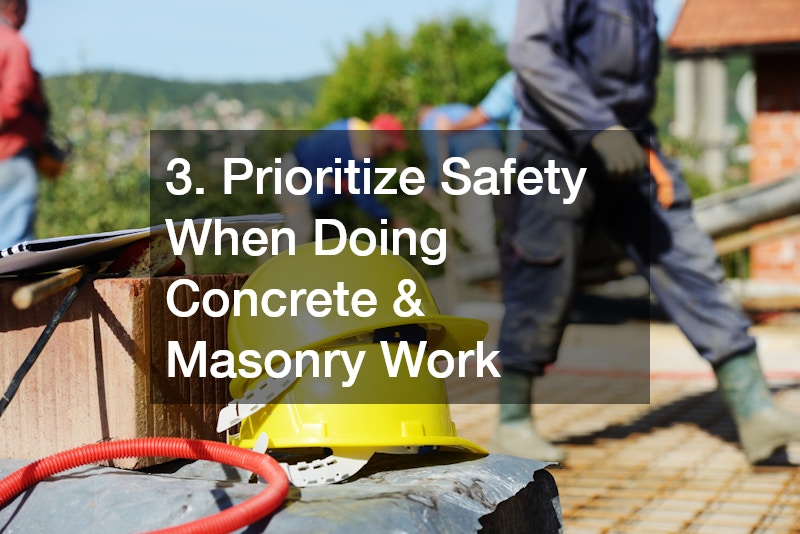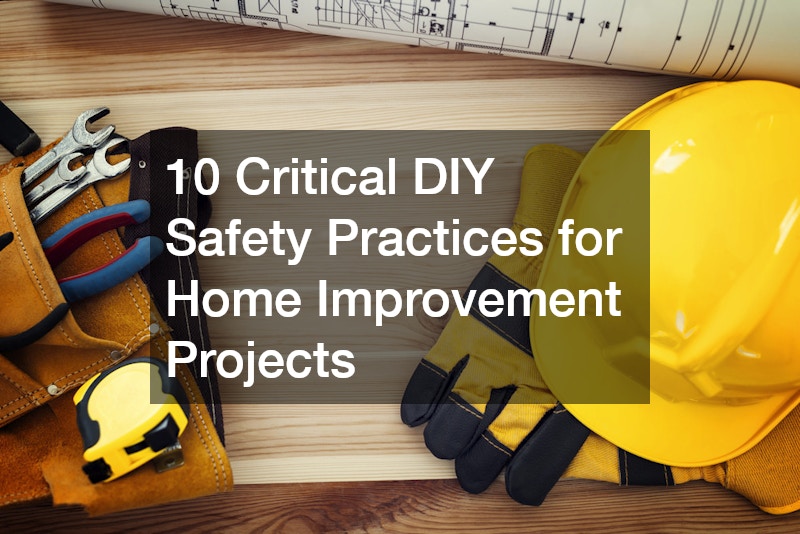DIY enthusiasts are often unaware of the importance of working practices to ensure safety when undertaking home projects. Each task requires careful consideration of tools, techniques, and safety measures. This article will discuss essential DIY practices to help you avoid injury and complete your home improvement project successfully.
1. Know Why Safe DIY Practices Matter
It’s important to set up effective working practices before beginning any home improvement project. This includes having the right tools, understanding how to use them, and knowing the risks involved with each task. Safety protocols are required for heavy machinery used in structural steel fabrication, for example. Safety guidelines are also important when rigging services are used to move heavy materials. You must evaluate all risks and implement appropriate working practices to protect yourself and your house.
Before you begin, it is important to know the scope of work for larger projects such as home elevation or driveway construction. Researching thoroughly, using the right equipment, and knowing when to consult a professional are all important working practices. Concrete masonry requires knowledge of mixing and pouring of concrete, while garage door repairs often require the use of power tools and ladders. The safety precautions vary according to the task. However, the key to success will always be to stay aware of any potential hazards and take proactive measures to minimize risks.
2. Hire Professionals for Complex Projects
Some home projects are not suitable for DIYers. This is especially true when they require heavy machinery or technical expertise. Home elevation projects, for example, require structural engineering expertise and structural steel fabrication. Consult a contractor to evaluate the foundation and design of your home. You could cause structural damage or an accident if you try to do this without the necessary knowledge. In this situation, you should use professional rigging to safely lift heavy materials and have the proper equipment to secure the loads.
It’s also important to know your limits when performing tasks such as asphalt driveway installation or the repair of garage doors. Garage door repairs often involve electrical components and require specialized tools to create a durable, smooth surface. Wearing protective gear such as goggles, gloves, and hard hats is important in both cases. You may also want to consider hiring professionals to handle the more complex aspects of the project. Hiring a professional for septic services ensures that the work is done in compliance with safety regulations. This keeps your home as well as the environment free from contamination.
3. Prioritize Safety When Doing Concrete & Masonry Work

Concrete services and concrete masonry services are popular DIY home improvement choices, whether you are building a driveway, patio, or sidewalk. These tasks are not without risk. It’s important to use concrete-mixing practices that reduce exposure to potentially hazardous chemicals. Wear protective gloves, goggles, and a mask to avoid skin irritations or dust inhalation.
It is also important to ensure that concrete materials are handled properly. To avoid uneven curing, the mix should be prepared in small batches. It is important to do this when you are working on larger structural projects, such as home elevations or foundations for additions. Hiring a contractor who is familiar with masonry to help with complex structural elements that are complex can save you time and avoid costly mistakes. Plan your work practices for smaller DIY projects to ensure you are handling materials efficiently and safely.
4. Lift and Handle Heavy Materials Safely
To avoid injuries, it is important to follow safety protocols when working with heavy materials such as structural steel or asphalt. For moving heavy, large items in a safe manner, rigging services can be a valuable resource. To avoid injury or strain, use the correct lifting technique when lifting and moving heavy items. You should bend your knees and not your back when lifting heavy objects. Use mechanical aids such as hoists or cranes when possible.
Avoid accidents by storing and transporting asphalt or concrete correctly. Asphalt should be heated to keep it malleable during application. Concrete should also be poured with the correct consistency to prevent accidents. Transporting materials from and to job sites should incorporate safe lifting practices. The focus should be on the use of the right tools and precision to move materials. Overexertion and improper handling are the leading causes of injury during home improvement projects.
5. Implement Safety Measures for Home Elevation Projects
Home elevations can be challenging and require special working methods. This type of work requires structural steel fabrication, and it is not for the faint-hearted. Home elevation is usually best left to a contractor familiar with local building codes and regulations. It may be necessary to hire rigging professionals to safely lift the structure.
Before lifting your home, make sure that you have all the necessary materials and that the foundation is properly secured. It can take several weeks to elevate your home, so you need to consider the weather conditions and other environmental factors. When working on smaller projects, like adding an extra level or building a deck, you should focus on the safety of materials, maintaining ladders and scaffolding, and using tools properly.
6. Wear Protective Gear
Wearing protective gear is a fundamental part of any DIY project. Wear safety gear when performing tasks like garage door repairs, handling asphalt materials, or working with concrete. Wear gloves to protect your hands from harsh surfaces or chemicals. Use eye protection to shield your eyes from flying debris. And use earplugs when using loud machinery such as concrete mixers and power tools.
Wearing a steel-toe boot and a hard hat can also provide extra protection from head and foot injuries. This is especially important when working on structural steel fabrication or home elevation. Proper footwear can be crucial when performing tasks that require heavy lifting or working on uneven surfaces, such as asphalt or concrete. Assess the risks associated with your project to determine what protective gear will minimize them. This is a vital part of your work and can prevent accidents.
7. Know When to Call the Experts
No matter how meticulous you are in your work, some projects are better left to professionals. While DIY projects may save you money, if you don’t have the right skills, they could lead to costly mistakes or accidents. Most homeowners lack the knowledge and equipment needed to perform tasks like septic service or even home elevation. Rigging, for instance, requires professionals with the knowledge and skills to handle and lift heavy material safely. This is a skill set that may be beyond the reach of many DIYers.
Contractors with experience should also fabricate structural steel for major structural changes in your home. Incorrect handling of these materials could have severe consequences, including damage to the foundation of your home or injury. It’s important to assess the risks and determine when you should call in a contractor to help with the project. Making the right choice will keep you safe and ensure that your home renovation project is completed to a high standard.
8. Understand DIY Risks Before You Start
It’s important to know the risks before you start any home improvement project. Every task, whether it’s garage door repair or home elevation, comes with its own set of risks that can lead to injuries or damage to property if handled improperly. You could be at risk of injury while working with structural steel fabrication due to sharp edges, heavy lifting, and welding equipment. Working with concrete services, for example, can be dangerous due to the equipment needed or the possibility of skin irritation.
You can reduce the risk of injury by identifying specific hazards and adjusting your work practices. Using a professional to rig heavy lifts can help prevent injuries caused by mishandling of materials. Tasks like asphalt driveway construction and septic service should also be planned carefully, since they can involve hazardous chemicals or equipment that is difficult to use without the proper training. By being aware of the risks, you can take precautions to reduce the risk of an accident or injury.
9. Choose the Right Tools for Safe DIY Work

The right tools are essential to a safe work environment. The right tools are essential for any job, whether it’s concrete masonry, garage door repair, or asphalt driveway construction. They reduce the risk of accidents and increase efficiency. A high-quality mixer, trowels, and levels are essential to a smooth finish when working with concrete. When undertaking a home-elevation project, using the right scaffolding and lifting equipment will ensure that the work is completed safely and securely.
It is also important to regularly maintain your tools to ensure that they work correctly. Faulty equipment can be hazardous, especially when you are working with structural steel or lifting heavy items. Before each project, inspect your equipment for signs of wear and damage. Consult a professional or home builder if you are unsure of the correct tools to use for a particular task. This will ensure you are adequately prepared for any DIY project. Proper techniques and the right tools will ensure that you can complete your DIY projects safely.
10. Manage Stress and Fatigue During the Project
Home improvement projects are physically and mentally demanding. Fatigue can be caused by long hours spent lifting, measuring, and performing manual labor. This increases the risk of an accident. You should recognize signs of fatigue and stress and take breaks as needed. Exhaustion can affect your judgment and reaction time when you are performing tasks like septic service and asphalt driveway installation. This puts both yourself and others in danger.
It is important to manage fatigue and stress in your work. Set realistic daily goals and rest as needed. Maintaining your energy level during home improvement projects is dependent on hydration, nutrition, and sleep. When you are tackling complex tasks, such as structural steel fabrication or elevating your home, breaking them down into smaller, more manageable pieces will help you to stay focused and reduce mistakes. Never hesitate to seek help when a project becomes overwhelming. Hiring a professional or enlisting a friend’s help can reduce stress and ensure the project is completed to a high standard.
Closing Thoughts
The key to a successful DIY project is to use safe work practices at all times. Safety is paramount when you are working on concrete, asphalt, garage doors, or septic services. Although smaller projects can be managed, bigger ones like structural steel fabrication or home elevation should be handled with caution and professional assistance if needed.
You can minimize risks by focusing on the right planning, using rigging services, and knowing when to contact a contractor for your home improvement project. The working practices you use in the concrete masonry, glass, or other areas of home improvement are more than just guidelines. They’re vital to protect yourself, your home, and your property.
